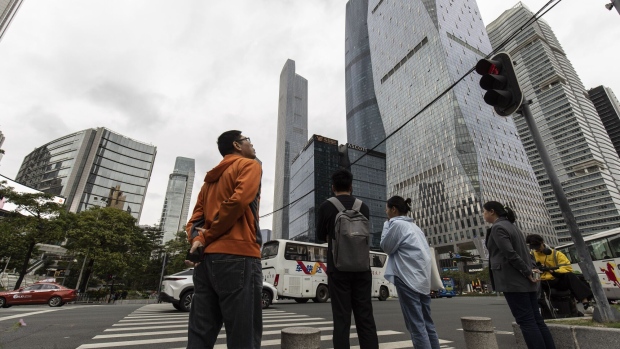Jan 3, 2024
China’s 10-Year Yield Hits Lowest Since 2020 on Easing Hopes
, Bloomberg News

(Bloomberg) -- China’s bond market rally has continued into 2024 as bets on the potential for interest-rate cuts gathered pace following weak economic data at the end of last year.
The yield on 10-year sovereign notes dropped to 2.54% on Thursday, the lowest since April 2020, extending a decline that kicked off in November. A combination of liquidity support from the People’s Bank of China and major lenders slashing deposit rates for a third time in 2023 fueled expectations that Beijing will loosen monetary policy further to aid growth.
“Rate-cut expectations are in play and also markets overall remain bearish on China’s growth outlook,” said Albert Leung, a strategist at Nomura International in Hong Kong. Yields may have more room to fall if those rate cut expectations hold firm in the absence of any forceful fiscal or property stimulus, he added.
The outlook for China government bonds this year is dependent on whether or not the PBOC loosens policy — and to what degree — in order to support a fragile economic rebound, according to analysts. The market had a volatile last few months, with yields first spiking due to concerns over debt issuance before falling again thanks to generous cash injections from the PBOC.
The benchmark yield fell about 11 basis points in December, the most in more than a year.
China’s economic recovery remains under pressure from weak demand and a lingering property crisis, despite a step up in both fiscal and monetary stimulus last year. A gauge of manufacturing activity slipped deeper into contractionary territory in December, though a services measure released Thursday showed some signs of expansion.
The chance for the PBOC to reduce its policy rate in January is high and such a move can be made following the release of inflation and credit growth data, according to Serena Zhou, a senior China economist at Mizuho Securities.
The nation’s next consumer price figures are due for release on Jan. 12, according to data compiled by Bloomberg. Data last month showed prices fell at the steepest pace in three years while producer costs dropped even further into negative territory.
Meanwhile, a rebound in the yuan has likely eased some pressure on PBOC officials, wary any easing could also trigger further depreciation in the currency.
“The more stable yuan and low inflation have opened the window for PBOC easing,” said Samuel Tse, an economist at DBS Group Holdings Ltd. in Hong Kong. “A reserve ratio cut is in sight, probably in this quarter.”
--With assistance from Shulun Huang.
(Updates throughout.)
©2024 Bloomberg L.P.






